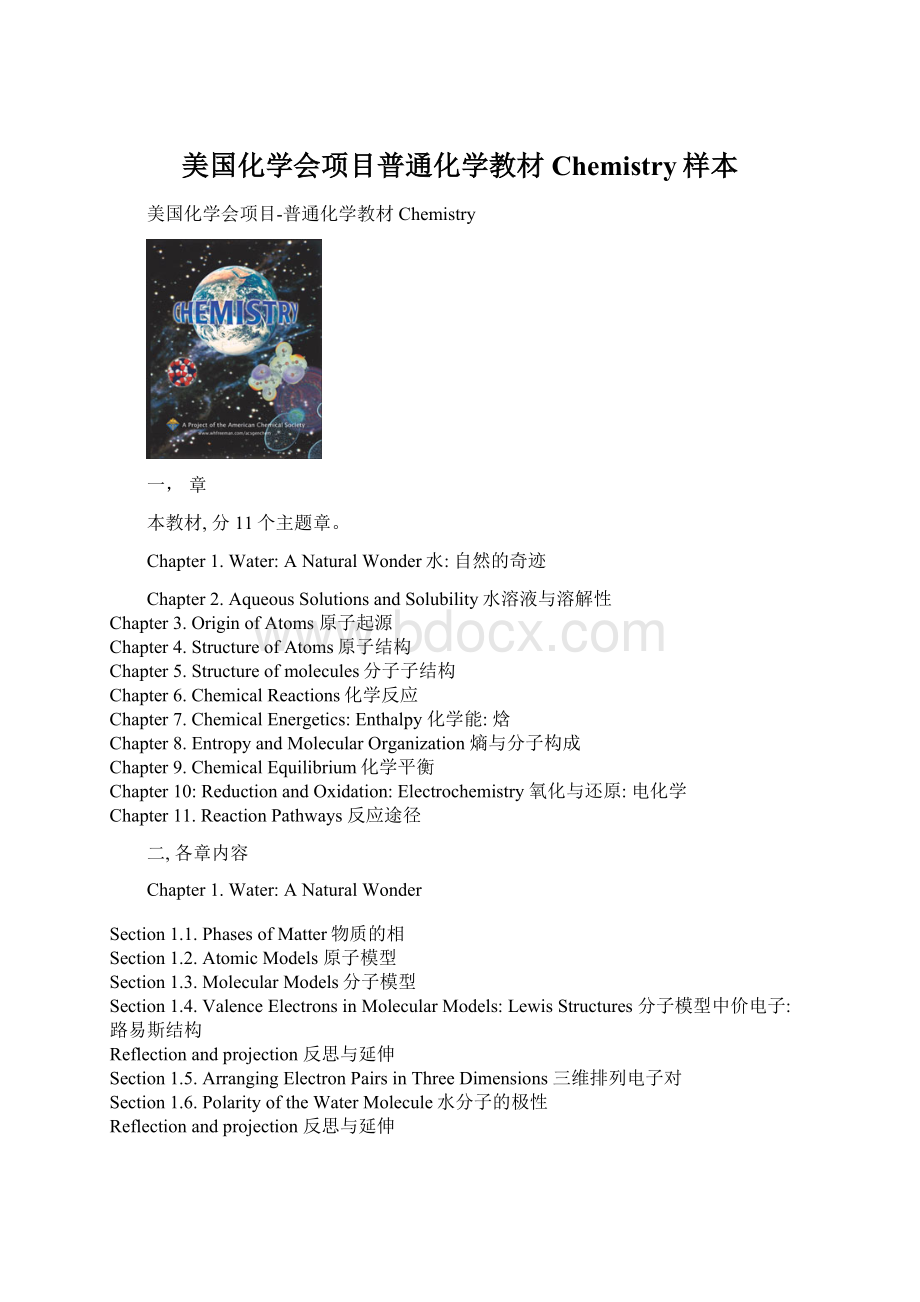美国化学会项目普通化学教材Chemistry样本Word格式.docx
《美国化学会项目普通化学教材Chemistry样本Word格式.docx》由会员分享,可在线阅读,更多相关《美国化学会项目普通化学教材Chemistry样本Word格式.docx(15页珍藏版)》请在冰豆网上搜索。

路易斯结构
Reflectionandprojection反思与延伸
Section1.5.
ArrangingElectronPairsinThreeDimensions三维排列电子对
Section1.6.
PolarityoftheWaterMolecule水分子的极性
Section1.7.
WhyIsWaterLiquidatRoomTemperature?
室温下水为何是液体
Section1.8.
FurtherStructuralEffectsofHydrogenBondinginWater水中氢键的结构效果
Section1.9.
HydrogenBondsinBiomolecules生物分子氢键
Section1.10.
PhaseChanges:
LiquidtoGas相变:
液体到气体
Section1.11.
CountingMolecules:
TheMole数分子:
摩尔
Section1.12.
SpecificHeatofWater:
KeepingtheEarth'
sTemperatureStable水的热:
保持大气温度稳定
Section1.13.
OutcomesReview复习
Section1.14.
EXTENSION
--LiquidViscosity扩展-液体粘度
Chapter2.AqueousSolutionsandSolubility
Section2.1.
SubstancesinSolution溶液中物质
Section2.2.
SolutionsofPolarMoleculesinWater极性分子在水中的溶液
Section2.3.
CharacteristicsofSolutionsofIonicCompoundsinWater离子化合物在水中溶液特点
Section2.4.
FormationofIonicCompounds离子化合物的生成
Section2.5.
AqueousSolutionsofIonicCompounds离子化合物的水溶液
Section2.6.
PrecipitationReactionsofIonsinSolution溶液中离子沉淀反应
Section2.7.
SolubilityRulesforIonicCompounds离子化合物的溶度积规则
Section2.8.
ConcentrationsandMoles浓度和摩尔
Section2.9.
Mass-Mole-VolumeCalculations质量-摩尔-体积计算
Section2.10.
ReactionStoichiometryinSolutions溶液反应定量关系
Section2.11.
SolutionsofGasesinWater气体溶于水的溶液
Section2.12.
TheAcid-BaseReactionofWaterwithItself
Section2.13.
AcidsandBasesinAqueousSolutions酸碱在水溶液中
Section2.14.
StoichiometryofAcid-BaseReactions酸碱反应定量关系
Section2.15.
ChemicalReactionsofDissolvedCarbonDioxide溶解的二氧化碳化学反应
Section2.16.
Section2.17.
--LaChatelier'
sPrinciple
Chapter3.OriginofAtoms
Section3.1.
TheNuclearAtom原子核
Section3.2.
SpectroscopyandStellarComposition光谱和恒星成分
Section3.3.
EvolutionoftheUniverse:
Stars宇宙进化:
恒星
Section3.4.
NuclearReactions核反应
Section3.5.
NuclearReactionEnergies核反应能
Section3.6.
CosmicElementalAbundanceandNuclearStability宇宙中元素分布量与核稳定性
Section3.7.
FormationofPlanets:
TheEarth行星的形成:
地球
Section3.8.
Section3.9.
EXTENSION:
Isotopes:
AgeoftheUniverseandaTasteofHoney扩展-宇宙的年龄与蜂蜜的味道
Chapter4.StructureofAtoms
Section4.1.
PeriodicityandthePeriodicTable周期性与周期表
Section4.2.
LightasaWave光被看作波
Section4.3.
PhotoelectricEffect:
LightasaParticle光电效应:
光被看作粒子
Section4.4.
WhyAtomicSpectraLooktheWayTheyDo:
QuantumModelofAtoms原子的量子模型
Section4.5.
IfaWaveCanBeaParticle,CanaParticleBeaWave?
如果波能是粒子,粒子能够是波吗?
Section4.6.
TheWaveModelofElectronsinAtoms原子中电子的波模型
Section4.7.
EnergiesofElectronsinAtoms:
WhyAtomsDon'
tCollapse原子中电子的能量:
为什么原子不坍陷
Section4.8.
Multi-electronAtoms:
ElectronSpin多电子原子:
电子自旋
Section4.9.
ElectronShellsandPeriodicity电子壳层和周期性
Section4.10.
WaveEquationsandAtomicOrbitals波方程与原子轨道
Section4.11.
Section4.12.
--EnergiesofaSphericalElectronWave扩展-球面电子波的能量
Chapter5.Structureofmolecules
Section5.1.
Isomers同分异构体
Section5.2.
LewisStructuresandMolecularModelsofIsomers路易斯结构与同分异构体的分子模型
Section5.3.
Sigmamolecularorbitals西格马分子轨道
Section5.4.
SigmaMolecularOrbitalsandMolecularGeometry西格马分子轨道和分子几何形状
Section5.5.
MultipleBonds多重键
Section5.6.
PiMolecularOrbitals派分子轨道
Section5.7.
Delocalizedpiorbitals离域派分子轨道
Section5.8.
RepresentationsofMolecularGeometry描绘分子几何形状
Section5.9.
Stereoisomerism立体异构现象
Section5.10.
FunctionalGroups
--MakingLifeInteresting功能团—使生命有趣
Section5.11.
MolecularRecognition分子识别
Section5.12.
Section5.13.
--AntibondingOrbitals:
TheOxygenStory扩展-反键轨道:
氧的故事
Chapter6.ChemicalReactions
Section6.1.
ClassifyingChemicalReactions化学反应分类
Section6.2.
IonicPrecipitationReactions离子沉淀反应
Section6.3.
LewisAcidsandBases:
Definition路易斯酸碱:
定义
Section6.4.
Bronsted-LowryAcid-BaseReactions路易斯酸碱:
Bronsted-Lowry酸碱反应
Section6.5.
PredictingStrengthsofLewis/Bronsted-LowryBasesandAcids测Lewis/Bronsted-Lowry酸碱强度
Section6.6.
MetalIonComplexes路易斯酸碱:
金属离子络合物
Section6.7.
ElectrophilesandNucleophiles路易斯酸碱:
亲电与亲核
Section6.8.
FormalCharge形式电荷
Section6.9.
Oxidation-ReductionReactions:
ElectronTransfer
氧化还原反应:
电子转移
Section6.10.
BalancingOxidation-ReductionReactionEquations氧化还原反应方程式配平
Section6.11.
Oxidation-ReductionReactionsofCarbon-containingMolecules含碳分子氧化还原反应
Section6.12.
Section6.13.
--Titration扩展-滴定
Enthalpy
Section7.1.
EnergyandChange能量和变化
Section7.2.
ThermalEnergy(Heat)andMechanicalEnergy(Work)热能(热)和机械能(功)
Section7.3.
ThermalEnergy(Heat)Transfer热能(热)传递
Section7.4.
StateFunctionsandPathFunctions状态函数和途径(过程)函数
Section7.5.
SystemandSurroundings体系与环境
Section7.6.
CalorimetryandIntroductiontoEnthalpy热量测定和焓介绍
Section7.7.
BondEnthalpies键焓
Section7.8.
StandardEnthalpiesofFormation标准生成焓
Section7.9.
HarnessingEnergyinLivingSystems生命体系能量利用
Section7.10.
EnthalpyRevisited再访焓
Section7.11.
WhatEnthalpyDoesn'
tTellUs焓没告诉我们的
Section7.12.
Section7.13
--Gases:
Pressure-VolumeWork扩展-气体:
压力体积功
Chapter8.EntropyandMolecularOrganization
Section8.1.
MixingandOsmosis混合与渗透
Section8.2.
ProbabilityandChange可能性与变化
Section8.3.
CountingMolecularArrangementsinMixtures计算混合物分子的排列
Section8.4.
ImplicationsforMixingandOsmosisinMacroscopicSystems宏观世界里混合与渗透的本质
Section8.5.
EnergyArrangementsAmongMolecules分子中能量排布
Section8.6.
Entropy熵
Section8.7.
PhaseChangesandNetEntropy相变与净熵
Section8.8.
GibbsFreeEnergy吉布斯自由能
Section8.9.
ThermodynamicsofRubber橡胶的热力学
Section8.10.
ColligativePropertiesofSolutions溶液的依数性
Section8.11.
OsmoticPressureCalculations渗透压计算
Section8.12.
ThermodynamicCalculationsforChemicalReactions化学反应热力学计算
Section8.13.
WhyOilandWaterDon'
tMix为什么油水不混合?
Section8.14.
AmbiphilicMolecules:
MicellesandBilayerMembranes两亲分子:
胶束和双分子膜
Section8.15.
TheCostofMolecularOrganization分子堆积的代价
Section8.16.
Section8.17.
OsmosisandCellMembranes渗透压与细胞膜
Chapter9.ChemicalEquilibrium
Section9.1.
TheNatureofEquilibrium平衡的本质
Section9.2.
MathematicalExpressionfortheEquilibriumCondition平衡条件的数学表示
Section9.3.
Acid-BaseReactionsandEquilibria酸碱反应和平衡
ReSection9.4.
SolutionsofConjugateAcid-BasePairs:
BufferSolutions共轭酸碱对溶液:
缓冲溶液
Section9.5.
Acid-BasePropertiesofProteins蛋白质的酸碱性质
Section9.6.
SolubilityEquilibriaforIonicSalts离子盐的溶解平衡
Section9.7.
ThermodynamicsandtheEquilibriumConstant热力学与平衡常数
Section9.8.
TemperatureDependenceoftheEquilibriumConstant平衡常数与温度的关系
Section9.9.
ThermodynamicsinLivingSystems生命体系的热力学
Section9.10.
Section9.11.
EXTENSION--CompetingEquilibria扩展-平衡竞争
Electrochemistry
Section10.1.
Electrolysis
电解
Section10.2.
ElectricCurrentfromChemicalReactions化学反应电流
Section10.3.
WorkFromElectrochemicalCells电池做的功
Section10.4.
ConcentrationDependenceofCellPotentials浓度对电池电势影响
Section10.5.
FreeEnergyandElectrochemicalCells:
TheNernstEquation自由能和电化学电池:
能斯特方程式
Section10.6.
CombiningCellPotentialsforReactions
Section10.7.
Half-CellPotentials:
ReductionPotentials半电池电势:
还原电势
Section10.8.
ReductionPotentialsandtheNernstEquation还原电势和能斯特方程式
Section10.9.
Carbon-ContainingReducingAgents:
Glucose含碳还原剂:
葡萄糖
Section10.10.
CoupledRedoxReactions偶联还原反应
Reflectionandprojection反思与